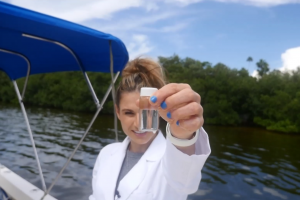
Environmental Health Research
Investigating how marine & freshwater chemicals impact public health
1600 Ken Thompson Parkway
Sarasota, FL 34236
Ph: (941) 388-4441
Hours: 10AM - 5PM
A 501(c)3 nonprofit organization.

The single greatest threat to sharks and rays is overfishing. A large part of overfishing is driven by the value of shark and ray products- especially meat and dried fins for shark fin soup-in international markets. International trade regulations can therefore be a powerful tool to push for effective shark and ray management.

Mote scientists are working with partners all over the world to better understand the species composition of trade in shark fins and meat. Our research in this area showed that two thirds of shark and ray species in the dried shark fin trade are threatened with extinction, which was presented during the most recent Conference of the Parties of the Convention on the International Trade in Endangered Species of Wild Fauna and Flora (CITES) and helped world governments to make the groundbreaking decision to better regulate trade in over 50 requiem and hammerhead shark species.
As these new trade regulations are implemented, then border control personnel are required to identify whether fins and meat are from CITES regulated species. Mote is at the forefront of developing easy-to-use PCR tests for these people to detect protected sharks and rays in trade, even deploying tests in ports where products enter the country. Working with authorities in some of the largest shark importing nations in Asia, Africa, Central America, and South America, these PCR tests are helping them detect shark and ray trafficking and allow them to enforce CITES regulations.